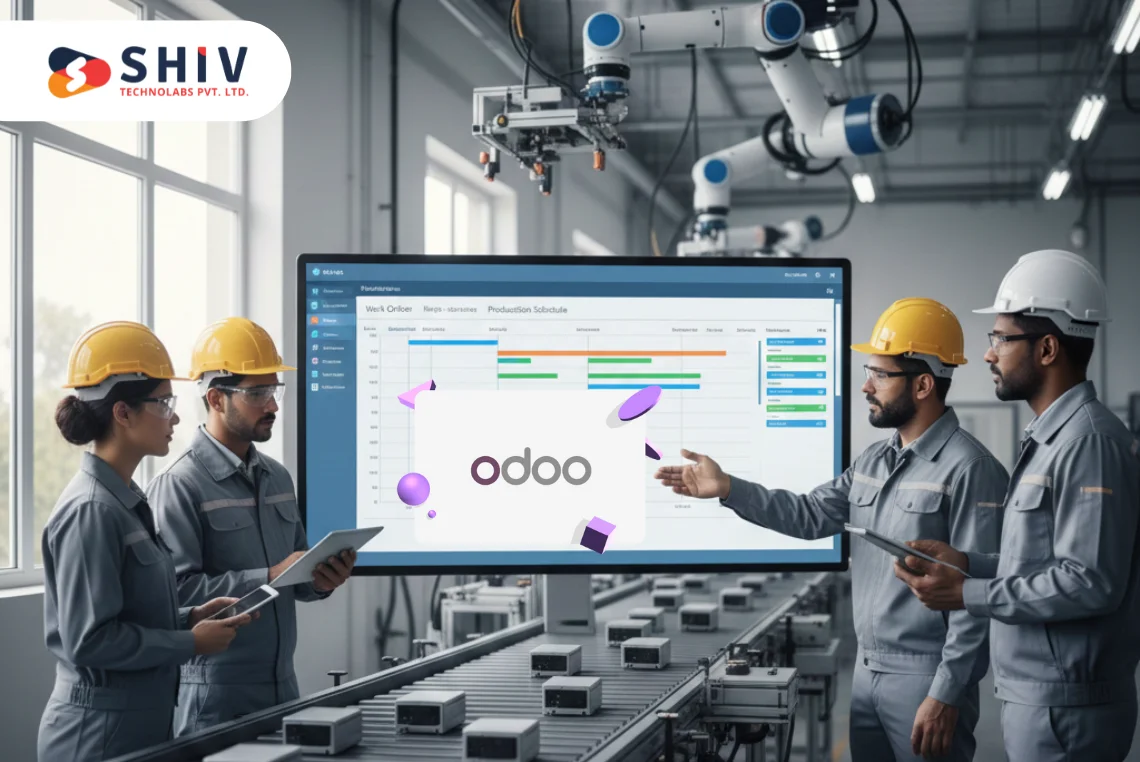Table of Contents
Effective supply chain management is essential for the textile industry, where managing raw materials, production, and distribution involves numerous challenges. From inventory tracking to order fulfillment, the complexities of this industry require robust tools to maintain efficiency. Odoo ERP has emerged as a game-changing solution, offering customized features to streamline operations and improve productivity. By leveraging Odoo ERP customization, businesses in the textile industry can overcome supply chain bottlenecks and achieve better coordination and visibility.
In this article, we’ll explore how Odoo ERP simplifies textile supply chain management, highlighting its key features, benefits, and why it’s the ideal choice for textile businesses.
Introduction to Odoo ERP in Textile Industry

The textile industry operates on a highly dynamic supply chain, with processes like raw material procurement, manufacturing, inventory management, and distribution playing critical roles. Odoo ERP, an open-source enterprise resource planning tool, offers a centralized platform to manage these operations seamlessly. By integrating various functions, Odoo ERP enables textile businesses to optimize resources, reduce costs, and enhance operational efficiency.
As a versatile system, Odoo is highly customizable, making it suitable for the unique requirements of textile businesses. From managing large-scale production to tracking supply chain metrics, Odoo ERP development services provide the tools necessary for end-to-end supply chain optimization.
Challenges in Textile Supply Chain Management
The textile supply chain faces numerous challenges due to its complex structure and reliance on timely processes. Key challenges include:
- Inventory Management: Tracking raw materials, semi-finished products, and finished goods can be daunting without proper systems in place.
- Order Management: Processing large volumes of customer orders with accuracy is critical to avoid delays and errors.
- Production Planning: Efficiently coordinating production schedules while minimizing downtime requires real-time insights into resources.
- Vendor Coordination: Managing multiple suppliers and ensuring timely delivery of materials can lead to bottlenecks.
- Distribution and Logistics: Ensuring timely delivery to customers while managing transportation costs is a significant challenge.
Traditional systems often fail to address these challenges, leading to inefficiencies and higher operational costs. This is where Odoo in textile industry proves invaluable.
How Odoo ERP Addresses Textile Supply Chain Challenges

Odoo ERP’s modular structure allows textile businesses to implement only the features they need, providing a cost-effective and scalable solution. Here’s how Odoo ERP simplifies supply chain management:
- Real-Time Data Access: Odoo provides a unified platform for tracking inventory levels, order statuses, and production schedules in real-time.
- Streamlined Processes: Automation of tasks like inventory updates, order confirmations, and vendor communications eliminates manual errors.
- Customizable Workflows: With Odoo ERP customization, businesses can tailor workflows to align with their specific operational requirements.
- Enhanced Communication: Odoo enables better collaboration between departments, suppliers, and distributors through centralized communication tools.
- Advanced Analytics: Built-in reporting and analytics help businesses make data-driven decisions for improved efficiency.
By addressing these challenges, Odoo ERP empowers textile businesses to manage their supply chain operations effectively.
Key Features of Odoo ERP for Textile Management
To optimize supply chain management, Odoo ERP offers several features that cater specifically to the needs of the textile industry:
# Inventory Management
- Track raw materials, semi-finished, and finished products in real time.
- Automate stock level alerts to prevent shortages or overstocking.
- Barcode scanning for faster and error-free inventory updates.
# Production Planning
- Schedule production runs based on demand forecasts.
- Allocate resources efficiently to minimize downtime and waste.
- Monitor production progress and identify bottlenecks.
# Vendor Management
- Maintain a centralized database of suppliers for easy access.
- Automate purchase orders and monitor supplier performance.
- Ensure timely delivery of raw materials with real-time tracking.
# Order Fulfillment
- Manage customer orders with automated processing and tracking.
- Ensure timely delivery with integrated logistics and shipment tracking.
- Provide customers with real-time updates on their orders.
# Reporting and Analytics
- Generate detailed reports on inventory, production, and sales.
- Analyze supply chain metrics to identify inefficiencies.
- Use predictive analytics for better demand forecasting.
These features collectively enhance supply chain visibility, helping businesses achieve better coordination and efficiency.
Benefits of Odoo ERP Customization for Supply Chains
The ability to customize an ERP system like Odoo ensures that businesses can align the platform with their unique operational needs. This flexibility is especially beneficial for supply chain management in industries like textiles, where challenges such as inventory tracking, vendor coordination, and logistics require tailored solutions. Odoo ERP customization allows businesses to design workflows, modules, and interfaces that cater to their specific requirements, delivering unparalleled efficiency and control.
Here’s an in-depth look at the key benefits of Odoo ERP customization for supply chain management:
# Tailored Workflows for Industry-Specific Processes
Every supply chain is different, with unique workflows depending on the industry. In the textile sector, for example, managing raw material procurement, dyeing, weaving, and distribution involves complex interdependencies.
- Custom workflows ensure that each stage of the supply chain is seamlessly connected.
- Tasks such as production planning, inventory replenishment, and quality control can be aligned with the company’s specific processes.
- Automation of repetitive tasks minimizes errors and reduces manual effort, leading to smoother operations.
# Improved Visibility and Real-Time Insights
Visibility across the supply chain is essential for decision-making and coordination. Customization enables businesses to access real-time data and insights specific to their operations.
- Dashboards can be customized to display critical metrics such as stock levels, supplier performance, and shipment statuses.
- Managers gain a clear overview of the supply chain, helping them anticipate disruptions and take corrective action.
- Real-time insights into production and inventory levels ensure better planning and resource allocation.
# Enhanced Efficiency Through Automation
Manual processes in supply chain management are time-consuming and prone to errors. Customizing Odoo ERP allows businesses to automate various supply chain activities, saving time and reducing operational inefficiencies.
- Automated purchase orders ensure that raw materials are replenished on time, avoiding production delays.
- Alerts and notifications keep teams informed about low stock levels, delayed shipments, or critical deadlines.
- Workflow automation speeds up order processing, enabling faster delivery and improved customer satisfaction.
# Scalability for Growing Businesses
As businesses grow, their supply chain requirements evolve. A generic ERP system may not be able to keep up with the increasing complexity, but customized Odoo ERP solutions are inherently scalable.
- New modules and functionalities can be added as the business expands into new markets or diversifies its operations.
- Existing features can be upgraded or enhanced to accommodate higher volumes of production or distribution.
- Scalability ensures that the ERP system remains relevant and effective, even as the supply chain grows in size and complexity.
# Seamless Integration with Third-Party Tools
In supply chain management, businesses often rely on multiple software tools for tasks such as transportation management, warehouse operations, and financial tracking. Odoo ERP customization allows seamless integration with these tools.
- Integration with third-party logistics (3PL) software enables better tracking of shipments and delivery timelines.
- Compatibility with accounting systems ensures accurate financial reporting and expense management.
- Data from various tools is consolidated into a single platform, providing a holistic view of supply chain operations.
# Cost Savings and Resource Optimization
Customization helps businesses focus on the features they need most, avoiding unnecessary functionalities that can complicate operations and increase costs.
- By implementing only the relevant modules, businesses can reduce licensing and implementation costs.
- Efficient workflows and real-time data help optimize resource utilization, reducing waste and lowering operational expenses.
- Custom reporting tools allow businesses to identify areas where costs can be minimized, such as transportation or inventory holding costs.
# Enhanced Collaboration and Communication
Supply chains involve multiple stakeholders, from suppliers and manufacturers to distributors and customers. Customizing Odoo ERP ensures that all parties have access to the information they need, fostering better collaboration.
- Role-based access controls allow different teams to view and update relevant data without compromising security.
- Communication tools can be integrated to facilitate seamless collaboration between on-site teams, remote workers, and external vendors.
- Centralized data ensures that everyone is working with accurate and up-to-date information, reducing misunderstandings and delays.
# Better Customer Service and Satisfaction
A streamlined supply chain directly impacts customer satisfaction by ensuring timely deliveries, accurate order fulfillment, and responsive service. Odoo ERP customization helps achieve these goals.
- Custom alerts for order statuses keep customers informed throughout the fulfillment process.
- Automated tracking updates enable customers to monitor their shipments in real-time.
- Efficient inventory management ensures that products are always available, reducing backorders and cancellations.
# Increased Flexibility and Adaptability
Market conditions and supply chain dynamics can change rapidly. Customized Odoo ERP systems are better equipped to adapt to these changes, ensuring business continuity.
- Businesses can modify workflows to accommodate new suppliers, regulations, or customer demands.
- Seasonal fluctuations in production or distribution can be managed more effectively with adaptable modules.
- Custom dashboards and reports allow businesses to respond quickly to emerging trends or disruptions.
# Future-Proof Supply Chain Operations
The textile industry is constantly evolving, with trends like sustainable sourcing and digital transformation shaping supply chain practices. Customizing Odoo ERP ensures that your supply chain is future-ready.
- Features can be developed to track and report sustainability metrics, helping businesses meet compliance standards.
- Integration with IoT devices allows real-time tracking of inventory and equipment performance.
- AI-powered analytics and forecasting tools can be incorporated to stay ahead of market trends and customer expectations.
Role of Odoo ERP Developers in Tailored Solutions
The success of Odoo ERP implementation largely depends on the expertise of Odoo ERP developers. Experienced developers ensure that the system is customized to meet the unique requirements of textile businesses.
Here’s what they bring to the table:
- Requirement Analysis: Developers assess your business needs to recommend the right modules and features.
- Custom Module Development: They design and implement custom modules for tasks like textile production tracking or supplier performance management.
- System Integration: Developers integrate Odoo with third-party tools for a seamless workflow.
- Ongoing Support: Post-deployment support ensures that the system continues to meet your operational needs.
Partnering with skilled developers like Shiv Technolabs ensures that your Odoo ERP system delivers maximum value.
Why Choose Shiv Technolabs for Odoo Customization Services in Singapore?
At Shiv Technolabs, we specialize in Odoo customization services in Singapore tailored to meet the unique demands of the textile industry. With years of experience in Odoo ERP development services, we provide end-to-end solutions that simplify supply chain management and drive business growth.
# Why Shiv Technolabs?
- Industry Expertise: Our team understands the complexities of the textile supply chain, enabling us to deliver customized solutions.
- Skilled Developers: We have a team of certified Odoo developers with expertise in module development, integration, and support.
- Client-Centric Approach: We prioritize your business goals, ensuring that the system aligns with your operational needs.
- Proven Track Record: With successful implementations across industries, we have the experience to deliver results.
By choosing Shiv Technolabs, you gain a reliable partner committed to optimizing your textile supply chain with Odoo ERP.
Future Trends in Textile Supply Chain with Odoo ERP
As technology evolves, Odoo ERP is set to play an even greater role in transforming textile supply chain management. Here are some future trends:
- AI and Machine Learning: Integration with AI tools will enable predictive analytics for better demand forecasting and inventory management.
- IoT Integration: IoT sensors can provide real-time data on inventory levels, machine performance, and logistics, enhancing operational efficiency.
- Blockchain for Transparency: Blockchain integration will improve traceability, ensuring ethical sourcing and compliance in the textile supply chain.
- Cloud-Based Solutions: Cloud-hosted Odoo ERP systems will enable remote access and collaboration, making supply chain management more flexible.
By staying ahead of these trends, businesses can maintain a competitive edge and drive innovation in their supply chains.
Conclusion
The textile industry’s complex supply chain demands efficient management tools, and Odoo ERP provides the perfect solution. By offering features like inventory tracking, production planning, and advanced analytics, Odoo simplifies operations and boosts productivity. With Odoo ERP customization from experts like Shiv Technolabs, textile businesses can tailor the platform to their unique needs, ensuring seamless workflows and cost-effective operations.
Whether you’re looking to optimize your supply chain or implement a scalable ERP system, contact Shiv Technolabs, as we are your trusted partner for Odoo customization services. Let us help you harness the power of Odoo ERP to transform your textile supply chain.




















